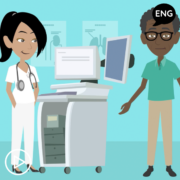PC Programs Archives
For resources and support related to Prostate Cancer Programs, please visit our main health center page.
Click here for Prostate Cancer.
What Questions Should You Consider Asking Your Prostate Cancer Care Team?
What Questions Should You Consider Asking Your Prostate Cancer Care Team? from Patient Empowerment Network on Vimeo.
How can prostate cancer patients have engaged conversations with their healthcare team? This animated video reviews key questions patients can ask to help them navigate their treatment and care decisions.
See More From Shared Decision Making: Navigating Prostate Cancer Care
Related Resources:

Building a Relationship With Your Prostate Cancer Healthcare Team |

|

|
Transcript:
Niki:
Hi, I’m Niki, and I’m a prostate cancer nurse practitioner. And this is Anthony, who is living with advanced prostate cancer.
[Disclaimer on screen: Patient experience depicted in this video is fictional.]
Anthony:
Thanks for joining us! In this video, Niki and I are going to walk you through key questions to ask your prostate cancer team as you navigate your care decisions.
First of all, it’s helpful to ask your physician how much experience they have treating prostate cancer patients. If appropriate, you may want to consider a second opinion.
Niki:
And it’s important to also have a deeper understanding of your disease by asking:
- What stage and grade is the prostate cancer? Has it spread beyond the prostate?
- Are there additional tests that you should undergo to provide a fuller picture of your disease?
- What educational resources are recommended to learn more about prostate cancer?
Anthony:
Once you understand more about your diagnosis and disease, then it’s time to really understand what steps could be next.
And, if – and when – your disease does need to be treated, you should feel engaged in deciding on your treatment plan.
Niki:
That’s right. You can start by asking if treatment needs to begin right away or if you will be monitored for any changes.
- Then, establish the goals of your treatment plan. Based on your diagnosis and stage of disease, is the goal to try to cure the cancer or to manage the disease symptoms?
- Ask what treatment options are available to you and which approach is recommended for YOUR disease?
- And inquire if there is a clinical trial that could be right for you.
- Finally, ask what your options are if the initial treatment doesn’t appear to be effective or if your disease progresses.
Once you know your options, ask about the potential short term and long-term side effects of each approach and how they may be managed.
Anthony:
You should also find out how your lifestyle may be impacted. For instance:
- Find out how each approach could impact your daily life, including your sex life, and for how long.
- You may also inquire about how treatment may impact fertility and if you should speak with a fertility specialist.
- Ask about the financial implications of each approach and whether there are resources for financial assistance.
Niki:
That’s great advice, Anthony. We hope these questions give you a good starting point for engaged conversations with your team. Remember, you may have more questions related to your individual situation, these are just a starting point to help.
Anthony:
Don’t forget to download the guide that accompanies this video. It will have a comprehensive list of the questions we have reviewed.
And visit powerfulpatients.org/PC to access more videos with Niki and me.
You Have a Role in Your Prostate Cancer Care Decisions
You Have a Role in Your Prostate Cancer Care Decisions from Patient Empowerment Network on Vimeo.
What role do patients play in their prostate cancer care decisions? This animated video reviews the shared decision-making process and outlines steps for patients to engage in their care.
See More From Shared Decision Making: Navigating Prostate Cancer Care
Related Resources:

Building a Relationship With Your Prostate Cancer Healthcare Team |

|

|
Transcript:
Niki:
Hi, I’m Niki, and I’m a prostate cancer nurse practitioner. And this is Anthony, who is living with advanced prostate cancer.
[Disclaimer on screen: Patient experience depicted in this video is fictional.]
Anthony:
Thanks for joining us! In this video, we’re going explain why you should take an active role in your prostate cancer care and review steps to help you engage in the decisions that need to be made.
Niki:
That’s right, Anthony.
Which leads me to the term “shared decision-making.” You may have heard of this term already – basically, it means that you and your healthcare team collaborate on care decisions and the goal is to have YOU be at the center of these decisions.
Anthony:
That’s right! For example, when it was time to discuss my care plan, my doctor walked me through the considerations of each approach and how each option could impact my lifestyle. I asked questions and shared my goals during the conversations. And I felt HEARD.
Niki:
Exactly – that’s shared decision-making in action. When you are living with cancer, often the risks and benefits need to be weighed to decide which course of action could be best for your individual disease. So why is it so vital to be an active participant? Studies show that patients who engage in their care may have better outcomes and experiences1. And it will help you learn more about your disease and move forward with confidence.
Anthony:
Now that you know what shared decision-making IS and why you should become a partner in your care, let’s review steps that will help you become more engaged:
The first, and most important step, is to educate yourself about your disease.
Niki:
Your doctor’s office can be a great source of information and resources, so it’s a good place to start. And there are also several advocacy groups that provide educational materials, for instance: [links on screen as they are read]:
- Patient Empowerment Network, the creator of this video.
- The Prostate Cancer Foundation.
- The Prostate Cancer Research Institute.
- The Prostate Health Education Network, which focuses on services and support for Black men.
- And ZERO-The End of Prostate Cancer.
Anthony:
Once you learn more about your prostate cancer through resources like these, you will feel more empowered to voice your opinions. Remember, it’s important to speak up and ask questions at each stage.
Niki:
So, what else can you do to be a partner in your decisions?
- First, make sure you understand and communicate the goals of your care before making any decisions.
- Then, make sure you are informed about your options and ask for supporting materials if you need clarity.
- And ask how your lifestyle may be impacted by each approach.
- You should also discuss the risks and benefits of each option.
- Request resources to aid in decision-making and information that can help determine the best route for your individual disease.
- As always, bring a friend or family member and discuss your options with loved ones.
- Finally, remember YOU are at the center of your care. You should feel comfortable with any choice before you move forward.
Anthony:
Now that you’ve watched this video, make sure to download the guide that contains highlights of this discussion – and you can print it out or save it on your computer to reference in the future.
Niki:
Visit powerfulpatients.org/PC to access more videos with Anthony and me. Thanks for joining us!
Building a Relationship With Your Prostate Cancer Healthcare Team
Building a Relationship With Your Prostate Cancer Healthcare Team from Patient Empowerment Network on Vimeo.
Who are the potential members of your prostate cancer team? This animated video reviews the key providers who may be involved in your care and provides tools for confidently communicating with team members.
See More From Shared Decision Making: Navigating Prostate Cancer Care
Related Resources:

|

|

|
Transcript:
Niki:
Hi, I’m Niki, and I’m a prostate cancer nurse practitioner. And this is Anthony, who is living with prostate cancer. Thanks for joining us!
[Disclaimer on screen: Patient experience depicted in this video is fictional.]
Anthony:
In this video, we’re going to walk you through the members of your prostate cancer healthcare team – and share tips for building strong relationships and communicating more effectively.
Niki:
When it comes to prostate cancer, you need a team that collaborates on all aspects of your care. And it’s vital that you utilize ALL the members. After all, they are there to help you.
So, who IS on your team?
There are several different providers who may be involved with your prostate cancer diagnosis and care:
- Let’s start with a urologist. This is a doctor who specializes in the male reproductive organs and can perform prostate cancer surgery. Some are also trained oncologists – urologic oncologists – who are specially trained in cancer.
- Then there could be a radiation oncologist. This team member specializes in treating prostate cancer with radiation.
- Next, there may also be a medical oncologist. This is a physician who is trained in non-surgical prostate cancer approaches, such as hormonal therapy and chemotherapy.
- And, finally, your primary care physician should also be kept in the loop.
Anthony:
And beyond your doctors, there is a whole team of supportive professionals to help you along the way. For instance:
- A nurse like Niki can provide you with information to help with decisions and share advice for managing day-to-day issues, including symptoms and side effects. You may also want to work with a nurse navigator, who is specially trained to help guide you through your cancer care.
- A social worker can help you navigate the details of your care and suggest support resources for you and your family.
- And a palliative care specialist can work with you on helping to relieve symptoms, pain, and even stress-related issues like anxiety and depression.
Niki:
There are several other team members you can rely upon, including:
- A pharmacist, who can dispense prescription medications and inform you of their use and potential side effects.
- A genetic counselor, who has special training in helping patients understand their genetic testing options and the potential impact of the results.
- And don’t forget mental health professionals. Treating your mental health is just as important as treating the prostate cancer itself.
Anthony:
Exactly. I struggled emotionally when I was diagnosed, so I reached out to the social worker, who connected me with a counselor and support groups. Seeing a professional and joining a group made feel less alone and more hopeful.
Niki:
And last, but not least, a care partner or loved one is another core member of your team.
Anthony:
Absolutely! Whether it’s a friend or family member, having someone with you at appointments or to talk about your options is beneficial.
Now that you know who may be on your team, let’s talk about strengthening communication. By communicating effectively, you can learn about your disease and become an active partner in care decisions. Here are a few tips to help you:
- First, make sure everyone on your team is aware of your care goals.
- And bring someone to appointments to help you write down important information and make sure to request post-visit summaries to help you retain the information.
- Ensure you have access to your patient portal and use the messaging service to communicate directly with your team members. Ask follow-up questions about your appointment if necessary.
- Finally, it’s essential to speak up in appointments. Your team wants to hear your questions and know how you are doing. It could help them adjust your care plan.
Niki:
Thank you for joining us – we hope you feel more empowered! And remember to download the guide that accompanies this video to review what we discussed.
Understanding Your Prostate Cancer Diagnosis
Understanding Your Prostate Cancer Diagnosis from Patient Empowerment Network on Vimeo.
What do you need to know about your prostate cancer diagnosis? This animated video reviews the diagnosis process and provides steps for working with your healthcare team to understand your individual disease.
See More From Shared Decision Making: Navigating Prostate Cancer Care
Related Resources:

|

Building a Relationship With Your Prostate Cancer Healthcare Team |

|
Transcript:
Niki:
Hi! I’m Niki, and I’m a prostate cancer nurse practitioner. And this is Anthony, who is living with prostate cancer.
[Disclaimer on screen: Patient experience depicted in this video is fictional.]
Anthony:
In this video, we’ll help you understand prostate cancer and how it is diagnosed and staged.
Niki:
So, what is prostate cancer exactly? It starts when cells in the prostate gland grow out of control, forming a cancerous tumor.
It’s the second most common cancer in American men. And while it can be serious, there are options available for prostate cancer care.
Anthony:
And there are certain risk factors that may make you more likely to develop prostate cancer, such as:
- Your age.
- Your race and ethnic background. For instance, Black men are more likely to be diagnosed with prostate cancer than men of other races.
- Your family history and your genetics.
Niki:
That’s right, Anthony. Now that we have a better understanding of what prostate cancer is, let’s move on to how it is diagnosed.
Your healthcare team will use a variety of tests to better understand your disease.
For example, A PSA test [PSA: Prostate-Specific Antigen on screen] and a biopsy may be used to confirm a diagnosis. And imaging tests—like an MRI or CT scan—are used to find out if the cancer has spread.
These test results also help your doctor stage your disease. Staging helps indicate the location of the cancer, whether it has spread beyond the prostate, and its impact on other areas of the body. It may also assist in guiding a patient’s treatment plan.
When staging prostate cancer, doctors may consider:
- The size of the primary tumor and where it is located.
- They’ll also factor in if the cancer has spread to nearby lymph nodes or other parts of the body.
- The patient’s PSA level is also used in staging. This test measures the amount of prostate-specific antigen in the blood.
- And finally, the cancer’s grade, which is based on the Gleason score. A Gleason score measures how likely the cancer is to spread and whether it is aggressive.
Anthony:
Thanks for explaining that, Niki. So, what are the stages of prostate cancer?
Niki:
Great question!
- Prostate cancer stages begin at stage I, which indicates a slower growing disease that is confined to the prostate.
- And stage II means the cancer is only in the prostate, but the disease may have an increased chance of growing or spreading.
- Stage III prostate cancer indicates that the tumor has spread to areas close to the prostate and may be considered locally advanced.
Anthony:
And I was diagnosed with stage IV prostate cancer, which means it has spread beyond the prostate and is considered advanced prostate cancer.
Niki:
That’s right. And because prostate cancer staging is complicated, it’s important to review test results with your doctor to understand your stage and grade. If you don’t understand your diagnosis, make sure to ask questions and request resources to help you.
Anthony:
Here are some additional steps you can take to feel more confident about understanding your diagnosis:
- First, ask about the stage of your prostate cancer and whether it is aggressive.
- And confirm that you have had all relevant testing to inform an accurate diagnosis, including genetic testing, if appropriate.
- Then, be sure to review the test results together with your team to make sure you understand how they impact your care and treatment options.
- Also, ask about your Gleason score and how it impacts your decisions.
Niki:
And find out how experienced your physician is in treating your type of prostate cancer and consider seeking a second opinion with a prostate cancer specialist.
Anthony:
Finally, don’t hesitate to request support resources to help you cope emotionally with your diagnosis.
Niki:
Visit powerfulpatients.org/pc to view all the videos in this series and download the guide that accompanies this video to review what we’ve discussed.
Anthony:
Thanks for joining us!
Tools for Becoming an Educated and Empowered Prostate Cancer Patient
Tools for Becoming an Educated and Empowered Prostate Cancer Patient from Patient Empowerment Network on Vimeo.
What steps can you take to become an empowered prostate cancer patient? In this animated video, you’ll learn tools for self-education and self-advocacy to help you partner in your care decisions.
See More From Shared Decision Making: Navigating Prostate Cancer Care
Related Resources:

|

Building a Relationship With Your Prostate Cancer Healthcare Team |

|
Transcript:
Niki:
Hi! I’m Niki, and I’m a prostate cancer nurse practitioner. And this is Anthony, who is living with advanced prostate cancer.
Together, we’re going to guide you through a series of videos to help you learn more about prostate cancer and give you steps to play an active role in your care and treatment decisions.
First, I want to introduce you to the organization responsible for this video—the Patient Empowerment Network—or “PEN.”
PEN’s mission is simple. It’s to provide cancer patients and care partners with the knowledge and tools to boost their confidence, put them in control of their healthcare journey, and assist them in their goal of receiving the best, most personalized care available.
[Patient experience depicted in this video is fictional.]
Anthony:
So, what does it mean to be an empowered patient? The World Health Organization defines it as “a process through which people gain greater control over decisions and actions affecting their health.”1
When I was first diagnosed with prostate cancer, I was overwhelmed, and I didn’t feel comfortable sharing my concerns and opinions. But through finding out more about my disease, working together with my team and learning to advocate for myself, I felt more in control and more confident speaking up.
Niki:
Exactly, Anthony. One of the first steps to becoming an empowered patient is to educate yourself about your disease. You can start learning about your prostate cancer by:
- Making sure you can access your online patient portal, if available, so you can view your medical records, communicate with your healthcare team, and access resources when you need them. If you don’t know how to use the patient portal, just ask your doctor’s office – they should have a set of instructions on hand.
- You can also visit credible prostate cancer advocacy groups to learn about your condition. These organizations are typically an excellent source of information and support. Ask your healthcare team for recommendations.
Remember, online information is never a substitute for medical advice. You should always consult your doctor about what you’ve learned. This will become easier as you get a better understanding of your disease and feel more comfortable sharing with your healthcare team.
Anthony:
That’s right, Niki. But, as I learned firsthand, speaking up is not always easy. Here are some tips that helped me:
- Write down your questions before your appointments. Visit powerfulpatients.org/pc to access office visit planners to help you organize your notes.
- And, try to bring a friend or loved one to your appointments to help you remember information and to take notes for you.
- Another tip is to be honest about how you feel and share any treatment side effects or symptoms you may be having with your healthcare team. Your doctor wants to know how you are doing and may be able to help you if you are having issues.
- It’s also a good idea to consider a second opinion to help you feel confident in your care and to provide piece of mind. This is especially important if you feel like you are not being heard.
- And, lastly, you have a voice in your care decisions. Don’t hesitate to ask questions – YOU are your own best advocate.
Niki:
That’s great advice, Anthony! We’ve covered a lot. So don’t forget to download the guide that goes with this video—it can help you remember what we’ve discussed.
Anthony:
And visit powerfulpatients.org/PC to view more videos with Niki and me. Thank you for joining us!
Key Questions for Prostate Cancer Patients to Ask Before Joining a Clinical Trial
Key Questions for Prostate Cancer Patients to Ask Before Joining a Clinical Trial from Patient Empowerment Network on Vimeo.
Dr. Andrew Armstrong, director of prostate cancer research at the Duke Cancer Institute, provides expert advice on what questions prostate cancer patients should ask when considering participation in a clinical trial.
Dr. Andrew J. Armstrong is a medical oncologist and director of clinical research at the Duke Cancer Institute’s Center for Prostate and Urologic Cancers. For more information on Dr. Armstrong here.
See More From Prostate Clinical Trials 201
Related Resources

Should Prostate Cancer Patients Consider a Treatment in Clinical Trials? |

|

|
Transcript:
Katherine Banwell:
What are some key questions that patients should ask their healthcare team before even participating in a clinical trial?
Dr. Armstrong:
I think number one is what are the alternatives that I would have if I did not participate in the clinical trial? What are the standard of care therapies? And prostate cancer now has a vast menu. There is two different types of chemotherapy. There are two different types of target radiotherapy, that’s Pluvicto and radium. There’s immunotherapy, with Sipuleucel-T and other immune therapies. There are multiple hormonal drugs. There are precision medicines, like I mentioned, for men with certain hereditary types of prostate cancer. So, it’s important to hear what the standard of care is, and many patients don’t necessarily even hear that.
And then based on what patients have already seen and what’s the expectation? Risks and benefits around those.
And then on top of that, research can complement that or either replace or come after those standard of care approaches. Certainly if a patient has exhausted the standard of care approaches, a trial can offer real benefits.
It’s important to ask about risks. What have other patients experienced going into that study? What kind of toxicities, good or bad? What other – what’s the evidence that it has helped people before? If it’s never been studied in people, the evidence might just come from the laboratory. But hearing about why is this so promising, why have you chosen to invest so much time and energy in this trial, is a good question.
And then if you’re hearing about a trial and you’re making a decision to travel, sometimes asking questions about whether the trial will cover your lodging or transportation, gas money, airport travel. Some trials do do that.
You can also look on clinicaltrial.gov for sites that are near you. So, many centers open the same trial in a different state, so you can look on that website to see if there’s a trial near you for what you’re looking for.
How Can Prostate Cancer Patients Access Clinical Trials?
How Can Prostate Cancer Patients Access Clinical Trials? from Patient Empowerment Network on Vimeo.
Dr. Andrew Armstrong shares trusted resources for accessing information about prostate cancer clinical trials and reviews common barriers to participation.
Dr. Andrew J. Armstrong is a medical oncologist and director of clinical research at the Duke Cancer Institute’s Center for Prostate and Urologic Cancers. For more information on Dr. Armstrong here.
See More From Prostate Clinical Trials 201
Related Resources

Should Prostate Cancer Patients Consider a Treatment in Clinical Trials? |

|

Key Questions for Prostate Cancer Patients to Ask Before Joining a Clinical Trial |
Transcript:
Katherine Banwell:
Yes, yes. How can patients find out about a trial that might be right for them?
Dr. Armstrong:
There’s several sources. One is through their doctor. You know, their doctor can be their navigator. They will be connected either within a cancer center or be connected to a cancer center that’s in their region. So, getting a referral to a cancer center can be that open door to hearing what trials a big cancer center might offer.
If patients are willing to travel longer distances, there are websites like clinicaltrials.gov where patients can search and find a trial, find a coordinator, find a principal investigator or doctor, contact them, and then either drive or fly to that site to access that trial. Not every patient has that means.
But that’s certainly a resource that many patients and their family members can use to seek out those trials. And I certainly have patients that have found me in that way.
But it’s probably more common for patients to come to you through a referral from their doctor because many sites in the community don’t have access to those clinical trials, but they know who does.
Katherine Banwell:
What are some common barriers to accessing clinical trials?
Dr. Armstrong:
The most important one is probably transportation. Some trials are close by, and some trials are very far away, and resources can be a major barrier. The cost of transportation, of having to be near a trial site, can be a major barrier. We wish we had all of the trials everywhere, but that’s not possible. Some trials are available at Duke, but are not available for example in Baltimore or Boston or California, and vice versa.
Each academic institution may have their own trials. There are going to be some big trials that are available everywhere. These are like global Phase III studies. And really just talking to the physician, maybe getting a second opinion about which trial may be right for you in a certain circumstance is really part of the shared decision-making process.
So, travel, socioeconomic status, cost concerns, those are barriers. But most clinical trials will pay for the experimental drugs. They will not charge you more money to participate in the study. And most insurance companies will pay for your participation in that trial, so that should not be a major barrier, but transportation can be. So, sometimes patients will find trials near a loved one or a family member so they can stay with them during the trial participation.



